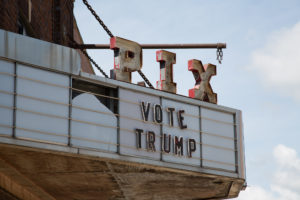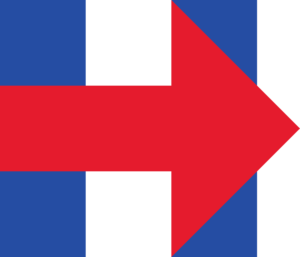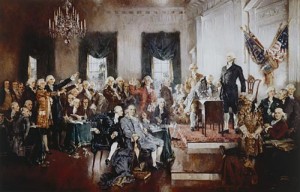The circus-like U.S. political process, with a media that treasures trivia over substance, is giving democracy a bad name in the world and making alternative structures look good by comparison, says ex-CIA official Graham E. Fuller.
By Graham E. Fuller
The “Great Debates” between candidates Clinton and Trump encapsulate what is wrong with the U.S. political process. There’s been little substance; it’s all about personalities and sound-bytes and gotcha. Never mind the grand issues of our time and how they should be addressed seriously and comprehensively — income inequality, corporate control of media, corporate-dominated electoral funding, global warming, long-term global refugee issues, jobs going overseas in perfect conformity with capitalist principles, Wall Street corruption, race relations, health care, etc.
None of these have easy — or palatable — answers and so the system reverts to entertainment over substance. The Romans got it right way back — it’s all about bread and circuses. We have only the trappings of democracy to pretend that the people are actually deciding anything.

The run-down PIX Theatre sign reads “Vote Trump” on Main Street in Sleepy Eye, Minnesota. July 15, 2016. (Photo by Tony Webster Flickr)
And it’s not new. Just read historical accounts of the savage political campaigns going back to our Founding Fathers down to the vituperative language of today. Sadly, this all may just reflect the human condition, locked in eternal struggles for power since cave men. Might generally makes right; but might today no longer flows from the cave-man’s club. Today it is control of the media, the banks, the political establishment. There will always be a political establishment defending its own.
Let’s not forget Winston Churchill’s famous quote that “democracy is the worst form of government except all those other forms that have been tried from time to time.” Corruption and incompetence may still be preferable to assassination or revolution that produce leaders nobody ever voted for.
When I was doing research among Islamists in the Middle East in years past, I was struck by one comment about why many Islamists have been coming around to appreciation of some aspects of democracy. Islam has always placed great weight on the religious obligation of the ruler to rule justly, to provide good governance. But what if the ruler doesn’t? Many Islamists have observed that democracy at least enables you to get rid of a ruler whom you don’t want, by due process. That is no small advantage, even if the political wheels of democracy grind slowly.
So what’s different about today, if anything? Two things jump out: money and media.
“Money makes the world go round,” as the song from Cabaret reminds us, and it certainly makes politics spin out of control. Is it not stunning to observe how, without the least trace of irony, the U.S. campaign system treats solicitation of bribes (“fund-raising”) as a legitimate and newsworthy part of electoral competition? It’s basically about who can fetch the highest price in the influence market.
Mark Twain, who got a lot of things right, commented that the U.S. “had the best Congress money can buy.”
Not New, But Worse
Now, only the naive would believe that influence-peddling is something new in the world. But to publicly champion the competition in which a candidate sells him/herself is really rather incredible. Recipients of contributions may claim they can remain independent-minded, but only a fool believes that when we receive a significant sum of money from a donor we are not influenced by that “gift.”
As for the media, of course it is not a public service. It is a line of business, whose owners also seek to mold public perceptions. (How many people are trying to kill off PBS?) Even the “paper of record,” The New York Times, routinely demonstrates striking bias: suppression of political candidates or voices who dare stray from mainstream establishment analysis. (How often do you ever see the name of Noam Chomsky in The New York Times on any topic? Or find balance in its reporting on Russia, Israel or China? Can we ignore the fact that mainstream media is bought and owned by an alarmingly small circle of wealthy who set general guidelines?
But what is really different these days is the pervasive reach of the media. One-hundred-and-fifty years ago how many people ever heard the Lincoln-Douglas debates? How many people ever read newspapers? What other sources of information existed apart from the town-crier? Or a campaigner coming through town once-in-a-lifetime on the back of a train in a whistle-stop campaign?
The transformation of politics into our modern infotainment is an invention of U.S. political culture. And that invention is in the process of bringing the U.S. down. Why? Because the issues that really matter are not discussed — because they are complex, can’t be reduced to sound-bytes, and nobody dares answer them honestly. Because image matters more than content.
And today this circus now occupies roughly half of any presidential term. U.S. politics are now almost in perpetual election mode.
The circus atmosphere bids up extremist postures by candidates. Okay, candidates might not really quite mean what they say on the campaign trail; they might not really do what they claim they will (or will not) do. But the fact remains that the level of discussion is coarsened and dumbed-down.
Incendiary sound-bytes linger in the political air long after they have been uttered, infusing greater demagogy to the political process, especially in Congress, for the rest of the political cycle. And the Establishment’s game play on foreign policy — what even President Obama recently referred to as “the Washington playbook” — is perpetuated.
Canadians complained when their last national election campaign was extended by loser Prime Minister Stephen Harper to run for 11 weeks. And Canadian politics are boring. Politics are not part of the entertainment scene. Maybe boring is good. It suggests things are more or less working.
The U.S., with the most advanced mass culture and mass info-technology in the world, has created this baleful system that is in the process of making the U.S. ungovernable, its policies increasingly ineffective, its citizens angry, its foreign policies incoherent.
But, as with many American firsts, has the U.S. now created a democratic model that may come to be emulated in the rest of the world? Hints of it can now be seen in Canada and the U.K., maybe on the Continent.
Looking at Alternatives
So what is the way out? Reform of the U.S. order would seem extremely difficult given its entrenched nature backed by so many powerful special interests.
Yet as the U.S. democratic order becomes increasingly dysfunctional, we already see revolts taking place. But revolts the world over historically often lead to greater autocracy, dictatorship or even revolution from the left or right. We know well the resulting horrors that can emerge from that. But people will always demand stability, protection, fixes for problems that are ever more complex to answer.
Wise men have, of course, grappled with this problem for centuries. The U.S. Founding Fathers tended to believe that day-to-day democracy should be insulated from the volatile passions of the people through more indirect government; the “wiser heads” of the Senate were supposed to balance the popular impulses as represented in the House. Presidents were elected “indirectly” through ostensibly “wiser” electoral colleges. All those arrangements, for what they were worth, broke down; such indirect elections are probably unachievable today.
Now let’s look at the other end of the spectrum. It’s interesting that China today is actually quietly touting to the rest of the world its own evolving system. Of course, we recoil from the terrible catastrophes of Chinese regimes over most of the past century. But we shouldn’t lose sight of the fact that China has been concerned with principles of good governance going back some 3,000 years, including Confucian principles of the responsibility of “cultivated” or educated people to govern wisely; that was probably as good as it got in that era.
More important, the Chinese state bureaucracy was selected through massive nation-wide examination systems to choose the most qualified. The system had its good periods and bad, almost on a 300-year cyclical basis — breakdown and restoration.
Facing Challenges
Today China is creeping back again, this time from the disasters of Chairman Mao towards a semblance of order and rationality in governance. It has implemented a series of often unusually effective policies that are slowly bringing an ever rising percent of the rural and urban poor into the middle class and a slightly freer life.
Now, I don’t want to live in China particularly. But consider the daunting challenges of running this country: one that was left behind in the last century or so, invaded by English and Japanese imperialists, massively misruled under fanatic communists (not all were fanatic) for 50 years, and now presides over a population approaching 1.4 billion people.
China’s leaders operate on the razor’s edge: meeting pent-up demand after decades of deprivation, managing the transition of millions of peasants who want to come to the cities, feeding and housing everyone, maintaining industrial production while trying to reverse the terrible environmental damage wrought in earlier decades, to maintain stability, law and order while managing discontent that could turn violent, and to maintain the present ruling party in power to which there is no reasonable alternative as yet. That’s quite a high-wire act.
So if you were running China today, what would you advocate as the best policies and system to adopt? Chances are few of us would simply urge huge new infusions of democracy and rampant capitalism. The delicate balance of this frail recovering system needs to be guided with care. But it is basically working — as opposed to looming alternatives of chaos and poverty.
China today suggests to developing countries that China’s own model of controlled cautious light authoritarian leadership — where leaders are groomed over decades up through the ranks of the party — may be a more reliable system than, say, the bread and circuses of the U.S. That’s their view.
No one system has all the answers. But it’s worth observing that by now the U.S. probably lies at one extreme of a political spectrum of bread-and-circus “democracy.” Can the system be reformed? Ever more serious questions arise about the present system’s ability to meet the challenge of this century — along multiple lines of measurements.
And, as the world gets more complex, there is less room for radical individualism, whistle-blowing, and dissent. Vital and complex infrastructural networks grow ever more vulnerable that can bring a state down. The state moves to protect itself. The strengthening of the state against the individual has already shifted heavily since the Global War on Terror and even more so under President Obama.
I’m not suggesting that China is the model to be emulated. But we better note how it represents one rational vision of functioning governance of the future — under difficult circumstances — at one end of the spectrum. The U.S. lies at the other.
Is there anything that might lie somewhere between these two highly diverse systems of governance? Just sayin’.
Graham E. Fuller is a former senior CIA official, author of numerous books on the Muslim World; his latest book is Breaking Faith: A novel of espionage and an American’s crisis of conscience in Pakistan. (Amazon, Kindle) grahamefuller.com




The author correctly points out how the current presidential election season has avoided discussing the “grand issues of our time”. He then lists a number of these issues but fails to mention the grandest issue of all – the 15+ year War on Terror which is set to morph into World War 3.
On its face, the article isn’t bad, but the fact is that the Republic of the united States is not supposed to be a democracy – it’s supposed to be a Constitutional Republic. Democracy is governance by force. A sovereign people, such as we are supposed to be, have given our rights to our usurpers in the federal government – who are not our masters, they are our servants. Read the US Constitution and tell me where the word democracy can be found…it can’t. The media is just one of the tools the federal government used against the people. https://waitforthedownfall.wordpress.com/truth-in-media/
” Is there anything that might lie somewhere between these two highly diverse systems of governance? ”
Is Sharia Law what Mr. Fuller has in mind , including for the U.S. ?
“…In 1999, while at RAND, Fuller advocated using Muslim forces to further US interests in Central Asia against both China and Russia. He stated, “The policy of guiding the evolution of Islam and of helping them against our adversaries worked marvelously well in Afghanistan against the Russians. The same doctrines can still be used to destabilize what remains of Russian power, and especially to counter the Chinese influence in Central Asia.” By all evidence, Fuller and his associates intended their man, Fethullah Gülen, to play perhaps the major role, in their operations to “destabilize what remains of Russian power, and especially to counter the Chinese influence in Central Asia.”
CIA career man Graham E. Fuller was a key backer of Fetullah Gülen and architect of the CIA Islam strategy since Afghanistan’s Mujahideen…….”
“….In 1999, Turkish television aired footage of Gülen delivering a sermon to a crowd of followers in which he revealed his aspirations for an Islamist Turkey ruled by Sharia (Islamic law), as well as the specific methods that should be used to attain that goal. ”
http://journal-neo.org/2016/07/25/what-is-fethullah-gulen/
Given that the U.S. can’t seem to maintain a government that functions in a decent manner , why do we , under Fuller’s guidance among others , try to foist Gulen’s ideas about governance on countries across the globe ?
And if Consortium News thinks Fuller’s project is a great idea , I’d like to hear their reasons why , but if they don’t , WTF is Fuller doing here ?
MY GOD!! CHINA!
If the US had supported the Chinese communists during their revolution,
perhaps some of the commenters would have a leg to stand on.
The US (democratically??) supported the corrupt regime of
Chaing Kai-Chek. Despite the advice of many US observers
on the scene at that time.
“Democracy” is perhaps the murder of blacks within its own
borders, support for the extermination of Palestinians
and so forth.
—Peter Loeb, Boston, MA,
APPRECIATION FOR FULLER
A deep appreciation to Graham fuller for his incisive
article “A Process that Makes Democracy Look Bad”.
With considerable less eloquence, I suggested that
I believed that Hillary Clinton was purposefully supporting
an opponent who would insult the basic constituent parts
of the traditional Democratic voter base. Blacks, Latinos,
etc, etc. That way she could escape having to deal with
any substantive issues where her “record” has been little
short of a disaster. It was indeed a risky strategy.
Donald Trump met the qualifications for such an opponent.
The sycophantic media cooperates.
No one cares ab out what they want. The entire
Democratic campaign is ab out what you do NOT
want.
Trump has obligingly gone the same route attacking
the character of his opponent, not the policies and
their results. Nor does Trump address the factg that
with the biggest walls in the world, there will not
exist enough high-paying jobs in America.
That awareness would be too uncomfortable for both
major candidates.
Unless, of course, one wants to work for a company
making products that kill non-Americans and even then
there is no longer any such thing as “job security”.
See Louis Uchitelle: “THE DISPOSEABLE AMERICAN”.
—-Peter Loeb, Boston, MA, usa
Another view on Fethullah Gulen, his organization and his powerful presence here in USA where he runs various taxpayers funded charters schools!
https://www.youtube.com/watch?v=tctl8FNasFo
In terms of government performance, Singapore is hard to beat. It is a fusion of parliamentary democracy with confucianism. Outstanding progress over the last 50 years. Google Singapore Governance to see the 4 principles.
A system in which leaders are groomed “up through the ranks of the party” is not the spectral opposite of our “bread and circus” system. Mr. Fuller appears to be advocating a anti-individualist oligarchy, translating our duopoly election circus to the Republican “mob rule” concept and suggesting the “stability” of authoritarianism under their oligarchy. They claim to be the chosen few because they equate money with wisdom and virtue. No, in unregulated market economies, money goes to the business bully-boys, the root of the corruption; they are not the salvation of democracy.
Cultivation of leadership is not done by single-party (or duopoly or oligarchy) control of candidates, except as in China where there was a history of class oppression and one party led the way to popular control. Not so in the US. China knew the truth about unregulated economic power better than the US, and was able to build a better engine to contain that dangerous fuel. If they can protect democracy from that economic power, they can make it more diverse, not less so.
Democracy in the US failed because it did not protect elections and mass media from steadily concentrating economic power: our Constitution was never modernized to deal with the new form of power, and those tools of democracy are now lost to its feudalism. Democracy in the US cannot be restored without those tools.
Restoration of US democracy means getting economic power out of elections and mass media, with Amendments to restrict their funding to registered and limited individual contributions. It means making Checks and Balances work within the legislative, executive, and judicial branches because they cannot check each other with such distinct functions, just as an airplane wheel cannot check or balance its rudder. Reform means getting the demagoguery out of Congress by having a new Policy Analysis branch make the policy debates among experts, protecting all viewpoints, challenging premises and assumptions, exposing deceptions, forcing logical arguments based upon facts, tossing out vague analogies, and making all debate summaries public. Reform requires better reasoning, not the “stable” anti-individualist authoritarianism of self-appointed bullies.
Actually the phrase “circus-like” hits the nail right on the head. Remember the way the Roman Empire hit on keeping the mob happy with bread and circuses? Well, elections are one of the myriad modern USA circuses – along with football, baseball, basketball, TV, radio, movies… while the “bread” has developed an immense, even grotesque variety that you can see for yourself in any big US grocery superstore.
I am surprised that Fuller seems not to know:
1. that most States normally regarded as democracies do NOT have huuuuge long “election campaigns” ruled by money and lobbies.
2. that the USA system is not interested in using the elections to instal someone who has the interests of the people at heart, rather than the Corporations (this applies in State as well as national elections). Studies show that the needs of 70% of the population are not even addressed (eg Gilens and Page 2014)
3. Allowing “elections” every few years, with “same old” policies is NOT democracy in action.
I must say I do miss I F Stone and his approach to research, information and follow up questioning and his publication processes.
How I enjoyed discovering and reading about him. All the way to acquiring his book of scholarship with its informative preface.
His record of working and doing stands despite all.
Isn’t a parliamentary system that “something in the middle”? And haven’t most democracies adopted a parliamentary system?
Democracy, and the congress, and the candidates and the News media, are the best that money can buy. Well at least the idea is, that the people play some small part to pick and choose. The Consent of the Governed gets some play!
News media make money too.
Chomsky better not see his name in the news. His gig is to be the outsider, with all his pessimistic, droll mumbling in his beer delivery, he makes one want to go have a couple. Nice sounding Titles, and soundbites like… ”Framing the Debate”, baloney.
He goes on and on, he only appeals to the poor college kids, who are spinning their wheels with the realization of the things they learning despite the best efforts of their professors.
[”And, as the world gets more complex, there is less room for radical individualism, whistle-blowing, and dissent.”]
The PTB, gave China everything they wanted, and what is left to give, Chinese are buying up, including what can be privatized and sold off of public assets.
At some point soon, you won’t want to say nothing about nothing.
While I generally enjoy and agree with your analysis on many subjects, I beg to differ on this one.
China is feudal. It’s decision mechanisms are built on patronage, and that patronage is bought, same as in the west.
The difference is that the Communist Party still controls monetary policy and they choose to inflate the economy with loans and bonds whilst keeping the Yuan artificially high. The US Govt for some reason thinks the Yuan is low, so there is absolutely no pressure to devalue.
So private investors in the west think China is rich because all that fiat money flows into foreign real estate through the forex black market. Emperor’s new clothes indeed.